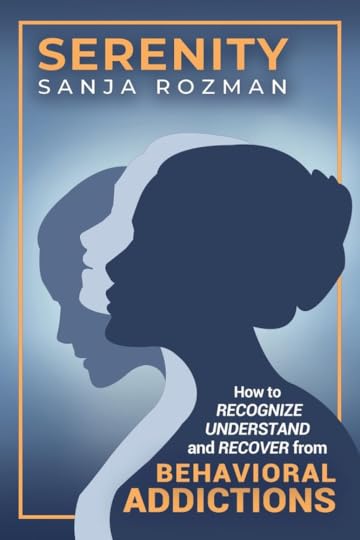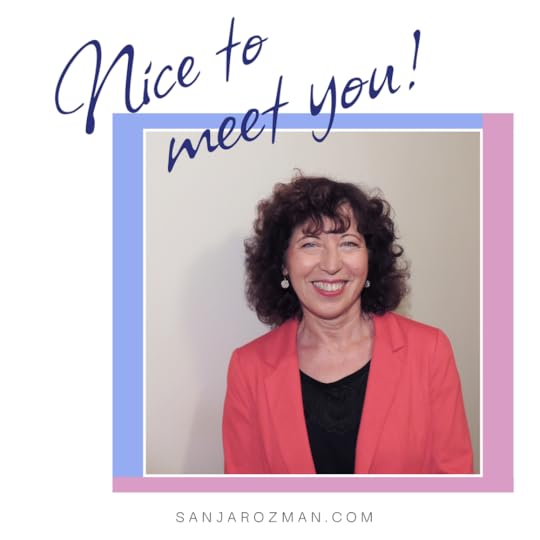Sanja Rozman's Blog
August 31, 2025
Why Good Intentions Always Fail in Addiction Recovery
March 16, 2025
Why can't I stop – even though I know it's wrong? When does a habit turn into addiction?
January 28, 2025
Am I addicted to Social Media? Test yourself.
On January 19, the popular social media platform TikTok was officially banned in the United States, following the US government's passage of the Protecting Americans from Foreign Adversary Controlled Applications Act. And though the ban was lifted mere hours later with the site’s triumphant return, its effects on users were profound. The symptoms suddenly bereft TikTok users described are characteristics of withdrawal. And that’s also why Brandylane Publishers, Inc. of Richmond, Virginia, has released a new self-help title, Serenity: How to Recognize, Understand, and Recover from Behavioral Addictions by Sanja Rozman. This book convincingly makes an increasingly scientifically recognized argument—that people can become addicted to activities like scrolling through social media, exercising and even working, just as they can become addicted to alcohol and cigarettes—and that the neural pathways and mechanisms involved in chasing the “hit” these activities provide are remarkably similar, or even identical, to those found in substance addictions.

Here is a short passage from the book, a test to check if your behavior around social media might be an addiction.
Do you recognize some of these behaviors, that are typical of cyber addicts:Addiction to the Internet and social media are new behavioral addictions characterized by a person’s obsessive, excessive, and compulsive overuse of social media and compulsive scrolling through online news feeds—apparently in search of entertaining or educational content, but in fact, to procrastinate or enter a state of numb oblivion—to the extent that it interferes with their everyday life. Although a specific addiction, disease, or disorder related to social media has not yet been officially medically recognized, behaviors characteristic of addiction are common when it comes to this topic. The proposed addiction has many similarities with gaming addiction, and even some similarities with gambling addiction. The brain centers that control reward and satiation are intensely stimulated by rewards, excitement, variable-ratio reinforcement, and drama, as well as by amplifiers like adrenalin and cortisol, therefore creating the potential for addiction.
Spending time scrolling through social media and news at the expense of other important activities, like performing at your job, completing schoolwork, visiting family, or going out with friends.
Feeling unable to stop scrolling through social media despite of the problems it creates (lack of sleep, isolation, etc.).
Obsessively thinking about social media even when you are not online.
Feeling the need to post every trivial detail of your life online in anticipation of receiving reactions in the form of “likes”.
Feeling pressure to compete with and compare yourself to other users.
Feeling depressed and envious if you believe your life and achievements are not as impressive as those of other social media users.
Feeling the urge to check your news feed regularly each day, and feeling anxious if you are unable to do so.
Frequently arguing with others over your use of social media.
Hiding your use of social media—especially of dating sites—from your partner or family.
Using the Internet, email, or social media to send intimidating or threatening messages (cyberbullying).
Procrastinating or wasting time by checking your news feed instead of working.
Anticipating “likes” and notifications to the degree that it interferes with your normal functioning.
Experiencing fatigue and stress, including sleep disorders, due your use of social media.
Using social media despite the potential for severe consequences (e.g., checking your instant messages while driving or while logged into a work computer).
Experiencing health issues such as headaches, blurry vision due to strained eyes as a result of long hours staring at a screen, back and neck pain due to consistent bending of the neck to look at your phone, or carpal tunnel syndrome[1] as a result of your use of electronics.

If you checked several such behaviors as your problems, find more about the condition in my book Serenity: How to Recognize, Understand, and Recover from Behavioral Addictions. There you’ll find all you need to know about behavioral addictions: extensive explanations, real-life examples, advice for the addicts as well as for their family members. The addicts will be able to construct their personal recovery plan according to the guidelines from the book. Even if you find out that you’re not (yet?) addicted, it’s wise to have your addictive behaviors in check for your future.

Dr. Sanja Rozman is a medical doctor, psychotherapist, and author of 9 books on behavioral addictions. Her newest book Serenity: How to Recognize, Understand, and Recover from Behavioral Addictions, features state-of-the-art descriptions, advice, and exercises, together with a template for your personalized recovery plan. Compassionate and easy to understand, it is your go-to manual for overcoming behavioral addictions.
December 15, 2024
Christmas madness - why do we keep shopping like there's no tomorrow?
Beautiful Christmas decorations, pictures of Santa and happy family gatherings everywhere, jingle bells songs and smell of candy and cinnamon in the air, keep boosting the fantasy that something special is in the air, and that it’s time to treat ourselves with beautiful offerings from the shop windows. Each year, this madness seems to start earlier; Black Friday starting early in November, followed by Cyber Monday, Thanksgiving, Saint Nicholas in Europe and then, finally, Christmas, followed by yet another good man Dedek Mraz in Slavic countries ... it just goes on and on, creating a beautiful illusion which abruptly ends in January when the bills start coming in. Kaching!
Where dopamine and fantasy get into the picture, we tend to feel elevated and high, and we may lose control of how far it is safe to go. Any prolonged exposure to the feel-good activities may result in compulsive (impossible to stop), excessive and obsessive behaviors and possibly addiction. (See How can people get addicted, when there’s no mind-altering substance involved?)

Shopaholics spend more than they can afford to avoid feeling lonely, angry or depressed. Afterward, they feel guilty for spending so much and may even try to return the goods—but they may also go shopping again as a way to feel less guilty about a previous shopping spree. Their relationships suffer because of their compulsive spending. What sets shopping addiction apart from other harmless types of shopping is that the behavior becomes the person’s primary way of coping with stress, even when it clearly harms other areas of their life.
The following text is a chapter from my newest book Serenity – How to recognize, understand and recover from behavioral addictions, that is about to be published by Brandylane Publishers Inc and available on Amazon next month. In it, I explain thoroughly how any obsession with otherwise pleasurable behavior can turn into a dangerous disease of addiction.
A behavioral addiction, shopping addiction is characterized by an overwhelming and compulsive need to purchase items, no matter what the consequences. People with shopping addiction often buy things they do not need, cannot afford, or do not use. They may shop online or in stores, alone or with others, impulsively or premeditatedly.
4.9% of the global adult population is estimated to have a shopping addiction.
It was reported that 7.6% of patients with shopping addiction have attempted suicide, with risks higher among women, those without family support, and the unemployed.
Addictions to money are behavioral addictions characterized by obsessive and out-of-control behavior involving hoarding, spending, shopping, incurring debts, and even avoiding money. In acting out these behaviors, the addicts use money and their relationship to money to escape, improve, or otherwise manipulate their own negative emotions, especially their feelings of low self-worth.
For people with insecure attachment styles, as addicts are, the whole world feels dangerous, and they may find that certain behaviors like shopping help them feel less anxious—thus affecting the pleasure and reward pathways in the brain. These addictions bear some similarities to gambling addiction, in that they also involve irrational behavior relating to money and may get the person into trouble or dependent relationships (in this case, between a creditor and a debtor) that may mirror the addict’s traumatic childhood relationships. (see Inside the love addict's brain). Moreover, obsessive seeking relief by manipulating with so called resources: money, power, goods, as well as debts, can lead to serious consequences.
People typically handle money, debt and risk based on the decisions dictated by their personal life scripts. Their behaviors around spending, saving, hoarding, worshiping, and even fearing money and poverty can become compulsive or obsessive. If they are not stopped despite the severe consequences they encounter, the diagnosis of an addiction is warranted. (see blog 11 signs of addiction). Typically, this kind of addiction presents itself as shopping and spending addiction, debt addiction, or even money avoidance.
I’m sure you worry if you already have crossed the line to addiction. In my newest book Serenity, I list the typical behaviors of shopaholics to help you come to terms with your fears.
Believing your happiness depends on how much money you have.
Obsessing over earning money.
Hoarding money or luxury items.
Obtaining money in unfair or illegal ways (e.g., fraud, scams, selling useless or stolen objects).
Shopping to improve your mood.
Being “in the red” most of the time.
Taking out loans to cover loans.
Investing in risky businesses, lending money to unreliable people or gamblers, or investing in money chains or cryptocurrencies.
Refusing to spend money you have saved for important things, like buying or renting a place to stay; or preferring to remain living in poor conditions so you can save.
Spending your partner’s money as revenge when they neglect you (financial infidelity).
Being constantly in debt to people who are emotionally important to you as a means of maintaining a connection to them, or using money as a measure of how important you are to loved ones (financial dependence).
Taking responsibility for paying off the debts of addicted family members (e.g., gamblers or drug addicts) so they do not leave you (financial enabling).
Taking excessive financial risks.
Borrowing from dangerous or unreliable people
Making risky business decisions.
Ignoring and violating financial regulations.
Driving dangerously, engaging in high-risk sports, or otherwise living “on the edge”.
An addict who engages in compulsive spending spends far beyond what is necessary, in order to feel better and avoid negative feelings like anxiety and depression. Shopaholics spend more than they can afford to in reaction to feeling angry or depressed. Afterward, they feel guilty for spending so much and may even try to return the goods—but they may also go shopping again as a way to feel less guilty about a previous shopping spree. Their relationships suffer because of their compulsive spending.
What sets shopping addiction apart from other harmless types of shopping is that the behavior becomes the person’s primary way of coping with stress, to the point where they continue to shop excessively, even when it clearly harms other areas of their life. And while some studies have found shopping addiction is more commonly found in women, others have shown an equal propensity for developing this addiction in both genders.
Advice for addicts
If you have found that your problems with money, debt, or risk-taking are obsessive and compulsive, you need professional help. The life scripts that lead a person to develop the addictions are not something you can change by yourself.
Advice for the addict’s family and friends
If one of your family members has this kind of addiction, their behavior may affect you in many ways. You may suffer from poverty or a lack of money, or feel a lack of attention and emotional presence on the part of your addicted family member. My advice to you is similar to the advice I give to family members of gamblers. These addicts need a rational perspective to point out the differences between what they imagine is real and what is actually real. They cannot rely on their own perceptions, because their denial distorts reality. Instead, someone aware of their addiction has to be there to stop them from fooling themselves. This is why I believe money and work addicts cannot fully recover without the initial help of relatives or friends, or at least someone who oversees their financial matters—and my experience as a therapist supports this view.
The text above is an excerpt from my newest book Serenity – How to recognize, understand and recover from behavioral addictions, that is about to be published by Brandylane Publishers Inc., and available on Amazon in January 2025.

Sanja Rozman is a medical doctor, psychotherapist and author of 8 books on behavioral addictions.
Read more in her book Serenity: How to Recognize, Understand, and Recover from Behavioral Addictions
that is about to be published by Brandylane Publishers Inc., Belle Isle Books.
September 9, 2024
10 most frequently asked questions about addiction
These days, if you look around, you will see a lot of people sitting in bars with cocktails on their tables, smoking tobacco and cannabis, and provocative nude pictures of women in commercials and on billboards everywhere … has having fun by abusing substances and behaviors become the norm in our culture? And where is the invisible line that one crosses to become an addict? Let’s take some time to rethink our boundaries:
The ugly truth is – you’ll probably be the last to know. You’ll notice other people exchange strange glances when you’ve poured yourself the third glass even before the waiter brought the menu, or feel the need to hide your drinking from others to avoid comments. You’ll try to control your drinking to “just a sip” to find out that the whole bottle was empty … addiction is a disease of denial, and people tend to ignore the warning signs. Ultimately, you may come to the point when it will be impossible to deny them anymore, and only then you’ll surrender to the realization that you can’t control your drinking (or any adverse behavior). Loss of control is the tell-tale sign of addiction, rather than the quality, quantity or severity of the behavior. (see 11 signs of addiction)
Acting out an addictive behavior can easily be stopped for a while, but very hard, sometimes almost impossible, in the long run. Addiction is a disease of certain brain circuits that drive our behaviors, and it is the long-term result of repeating the comforting and mood-changing behaviors. People like to think that they always choose and control their behaviors, but after frequent repetitions, especially when challenged by high stress and life changes, any comforting behavior may become automatic and uncontrollable.
When you admit to yourself that control over harmful behavior has been lost, your best chance to recover is to seek help from those who know what addiction is, and how to treat it.( See Is it true that addicts cannot just stop their use?)
Abstinence is not the same as recovery. However, it is the beginning, and an important one. But once you are sober and your body and psyche starts to recover, you will become able to address the painful issues that made you indulge in the comforting behaviors in the first place. There will probably be some traumatic issues from early childhood. Finding a good therapist is the best you can do to sort them out. If you feel too confident in your ability to control your behavior too soon, you may be caught off guard by life’s challenges, and relapse.e.
Abstinence means that you do not indulge in a specific behavior (drinking alcohol, gambling, using porn …) anymore. Sobriety, however, means that your mind (brain) is not under influence of and mind-altering substance or behavior. The point is; addiction is one disease, a hellish rollercoaster in your brain that can be run by many different substances and comforting behaviors. You may, for example, abstain from alcohol altogether, but if at the same time you gamble too much, your brain will experience similar alterations as under the influence of a substance, so you will not be sober. It is too easy to exchange one addictive behavior with another, or compound many of them in an addictive cocktail. But this is not sobriety nor recovery.
I think this is the most frequently asked question from people in early recovery, and even many therapists lower the bar by allowing, for example, smoking in rehabilitation centers for addiction. I, however, do not believe this to be safe. I have seen many people try, even after years of sobriety, but sooner or later they ended up losing control and relapsing. Once the brain learns its “shortcuts”, it will remember them easily and we’re back where we started from. (See Inability to stop & Addiction).

As a rule of thumb, you can expect your therapy to last from 3 to 5 years, depending on the difficulty of your problems and your ability to cooperate. A person’s psyche is a complex matter, made of millions of connected beliefs, prejudices and memories, mediated by the delicate neuronal connections. Once this complex structure is challenged, it needs time to recover and re-assemble in a new way. There are no shortcuts if you want your changes to last. (See What’s Trauma got to do with Addiction?)
However, therapy is not the same as recovery. After some time, you’ll be on your own, and there will be life with all its challenges. Some of them may tempt you to start using again and trying to fool yourself that it is safe enough. But what has been carved in your brain circuits has not been erased, and may awaken into a full-blown relapse in a very short time, shattering your life to pieces again. Recovery has to last forever and you may never take the shortcut again, if you don’t want to wake the sleeping beast inside you. To avoid the danger, it is wise to join a recovery community and practice the recovery rules, one day at the time.
It is not impossible, but certainly not easy to do. The human psyche has its defense mechanisms that avoid change and try to keep things as they are. Why struggle, when help is available? There are many good recovery programs available and you can find one that will suit you.
I don’t think this is a realistic goal. The goal of recovery is not to restart from zero, but to accept your history as part of your spiritual path. There will be some bruises and scars, but also some well-earned new skills. You will be aware that, whatever happened, you have survived and thrived through it, and it has made you stronger. (See Why is it so hard to change?).
When you feel ashamed of what you do …
When you try to control, curtail or stop the behavior, but fail …
When you feel the need to apologize for your behavior …
When you start worrying about the time and money you spent …
When you constantly think about the past and future acting-outs …
When you say “just a few minutes more,” and the next a few hours have passed …
When you get criticized for doing it during working hours …
When you decide to spend the weekend with your kids, and can’t stop thinking about anything but acting out …
When most quarrels at home revolve around your addictive behaviors …
When you feel incredibly anxious if you can’t get your next dose … (see 11 signs of addiction).
Addiction results in bad behavior, that affects all dimensions of the addict’s life, corrupts their relationships and results in a lot of misfortune for everyone. But it does not start like that. It rather starts by repeating what most people do when faced with painful circumstances or life’s anxieties. They learn that some comforting behavior, whether drinking alcohol or using marihuana, gambling, some relationship and sexual maneuvers or even only daydreaming, can correct their mood and ease their pain, without them doing anything to grow out of it. And then they repeat it too often: first as a choice, next as a habit, but then increasingly out of need. When they get so far, addicts really behave badly, but that does not mean they are intrinsically bad people. As a society, we support such behavior by putting pleasure on top of our priorities list, but we turn our backs at the addicts in the late stages, when we should support them in their recovery efforts.

Sanja Rozman is a medical doctor, psychotherapist and author of 8 books on behavioral addictions.
Read more in her book Serenity: How to Recognize, Understand, and Recover from Behavioral Addictions
that is about to be published by Brandylane Publishers Inc., Belle Isle Books.
August 31, 2024
10 most frequently asked questions about therapy
Looking at the names and photos on the internet, wondering what the different titles mean, asking for recommendations from friends … it’s confusing. Foremost, look for therapists with proper education and credentials, since many self-called therapists out there only attended some weekend workshops. Proper education guarantees that the person has undergone a thorough selection and done years of self-therapy, so they will not heal their own wounds upon your shoulders. Most of all, you need to feel safe with the person you choose and trust them to know how to lead you through the troubled waters. Sometimes this means you will need to try a couple of sessions with them before you know.
Most people initially shy away from group therapy because they are embarrassed to talk about their problems in public. However, for some conditions like addiction, group therapy is invaluable. Addiction is a social disease and one has to heal where the wounds are. The shame that drives addiction is best healed in a group of like-minded. Individual therapy is best for addressing traumatic experiences, especially when sexual trauma is involved.
This should not be a question, since the therapists are trained not to make a difference. However, you may feel safer with a person of your gender when speaking about domestic abuse. Also, if you grew up without a parent, a fatherly or a motherly figure may help you finish some undeveloped processes. Again, the person you choose should feel safe and trustworthy.
Psychiatrists are medical doctors, who specialize in treating mental diseases with medications. Some of them are extra trained in psychotherapy, too, but being overwhelmed with patients, usually, they do not take enough time to see you often enough to make a difference. If you do not have a mental disease, but just need help in sorting out a troubled relationship or recovering from emotional problems or addiction, a psychotherapist will be the best choice. Many different sorts of psychotherapy are quite different but be prepared for a lengthy relationship with someone safe to discuss your problems with. Bio-therapists are not therapists in the official sense, but sometimes just gifted people mindful of subtle changes in your energy and body. They may help you feel better or release some tension, but not to recover from serious problems.
As a rule of thumb, you can expect your therapy to last from 3 to 5 years, depending on the difficulty of your problems and your ability to cooperate. A person’s psyche is a complex matter, made of millions of connected beliefs, prejudices and memories, mediated by the delicate neuronal connections. Once this complex structure is challenged, it needs time to recover and re-assemble in a new way. There are no shortcuts if you want your changes to last.

Sitting and talking form the basis of talk therapy. The therapist challenges your fixed self-beliefs and helps you regulate your emotions. To heal your problems, you first have to be aware of them and learn some new skills, which you can achieve in the dialogue with the therapist. However, this is not everything you can do to speed up the process. Working on the whole spectrum of your abilities and combining talk therapy with positive changes in nutrition, exercise, sleep, relationships, and spirituality goes much deeper.
Extensive research has been done on the matter of adverse consequences of unsolved childhood trauma, and conditions like addictions, depression, obesity, other physical diseases, and even cancer are closely connected to it. Of course, you can’t undo the past, because it is gone. But those who have suffered traumatic changes in childhood, have trouble with letting go of the chronic stress that was the result. Their systems of alert may become stuck in high-stress zone for years and decades, thus causing all those pathological changes.
It is not impossible, but certainly not easy to do. The human psyche has its defense mechanisms that avoid change and try to keep things as they are. Why struggle, when help is available?
I don’t think this is a realistic goal. The goal of recovery is not to restart from zero, but to accept your history as part of your spiritual path. There will be some bruises and scars, but also some well-earned new skills. You will be aware that, whatever happened, you have survived and thrived through it, and it has made you stronger.
As you approach the end of recovery, it will spontaneously blend into your spiritual growth. You can expect your life to take a much less stressful course, your relationship to become comfortable and stable, and your joy of life to rise steadily. You will feel safe most of the time. Your emotions will no longer be a roller-coaster, but a steady wave of energy, giving things their meaning. Things that hurt you will still happen, but you will not repeat past mistakes and get out of trouble as soon as possible. And, most of all, you will be proud of yourself to have come this far.

Sanja Rozman is a medical doctor, psychotherapist and author of 8 books on behavioral addictions.
Read more in her book Serenity: How to Recognize, Understand, and Recover from Behavioral Addictions
that is about to be published by Brandylane Publishers Inc., Belle Isle Books.
August 13, 2024
Fear of intimacy. Why am I afraid to show my true feelings to the people I love?
Romantic relationships become stronger and thrive on building intimacy. Intimacy is a pleasant feeling of emotional closeness, connection, and trust we feel when we let someone see our true selves. But being close comes with some vulnerability and fear, since the person we opened to who may someday abandon us and so crush the foundations of our self-esteem. In romantic relationships, further avoiding emotional and sexual intimacy can end relationships you may have wanted to keep. You may abandon a romantic relationship that starts to become serious because you fear closeness.
For some people, intimacy is synonymous with sex or physical closeness to another person, usually a romantic partner. But it is possible to have a lot of sexual encounters, and never let your partners see who you truly are. Others have no problem sharing a lot of personal information with friends, but the person who is their sexual partner is not privy to that. There are many ways to pretend to be close and yet keep other people from knowing your innermost beliefs, truths and fears. What is the point?
Working for thirty years with traumatized and addicted people, I came to realize that they share a common denominator. A thought deep in the foundations of their being, that goes:
It may be illogical to you, why those who tend to cling to relationships and fear abandonment, actually also fear intimacy in relationships (previous blog: Fear of abandonment). Unable to control their separation anxiety, they may actually bring about the end of their relationship, as a form of a self-fulfilling prophecy.
Even though they superficially seem the opposites, fear of intimacy and fear of abandonment have something in common: a terrible dread of being left alone that can be traced back to relationship trauma. For an adult, being left alone or letting oneself be known should not be such a problem. But childhood experiences and traumas that cause a lack of trust in parental guardians or adults put people at risk of developing a fear of intimacy. (See How can childhood trauma change your life: Why can't I escape my past?).

To understand how a child can be traumatized in a relationship, there need not be dramatic events like abuse or abandonment. Many of my clients initially think that there was nothing wrong with their upbringing. But some parents are prone to criticizing their children, in good faith that they are helping them develop healthy lifestyles and avoid problems. Over-criticizing that is not balanced with nurturing and praise can cut deep wounds into the children’s vulnerable psyche. What children learn is that they are not good enough to deserve their parent’s love, so they concentrate on developing false selves and other defense strategies to avoid losing what they so desperately need.
We all have pretend personas or roles we hide behind, especially in relationships with persons to whom we don’t want to come too close. In communication with your boss, or your doctor, or at a job interview, you will try to show off your virtues and hide your flaws. Some social roles may be quite shallow, like the one you show to your neighbor whom you only meet on the stairs once in a while: polite talking about the weather is showing the necessary minimal attention while revealing nothing about yourself.
But in the personal and love relationships, it is not possible to wear the mask at all times. The closer your lover tries to get to know you, the greater the fear of being exposed as a failure, fraud, and imposter, then rejected and abandoned. (see Fear of abandonment. Why is it so hard for me to let go?). For some, the fear is such that they prefer to end the relationship themselves, avoiding their dread of being abandoned.
Everybody has the right for their own physical and emotional space. Personal boundaries and how to defend them are also learned in early relationships with our caregivers, and a lot of things can go wrong here. Boundaries may be nonexistent, permeable or rigid, usually dependent of the type of the relationship. Nonexistent and permeable boundaries allow for enmeshment and exploitation, while overly rigid boundaries lead to abandonment issues. To have functional relationships with romantic partners and family members, the boundaries must be flexible but respectful for both parties.
All relationships come with a degree of uncertainty. Many intimate relationships are worth having, even if they don’t last forever. Think about events in your life and try to understand where your fears come from. Are you unconsciously destroying relationships? And do you want more meaningful relationships? If you find that your troubled childhood might have made you relationship avoidant, you can profit with some professional help. (see blog Why is it so hard to change?)

Sanja Rozman is a medical doctor, psychotherapist and author of 8 books on behavioral addictions.
Read more in her book Serenity: How to Recognize, Understand, and Recover from Behavioral Addictions
that is about to be published by Brandylane Publishers Inc., Belle Isle Books.
July 7, 2024
Fear of abandonment. Why is it so hard for me to let go?
Rejection evokes in us the unbearable, sometimes physical pain, which has inspired numerous literary and poetic expressions, as in the Celine Dion’s famous song All By Myself, performed in the movie Bridget Jones’s Diary.
The feeling of being abandoned and rejected resonates with something very deep and primal in all of us. What is it?
People are born with the need to belong; it is one of our most important needs. When we are infants, we do not distinguish between ourselves and the rest of the world. Being in emotional symbiosis with our mother, we feel merged with her and everything there is. Only later, as we mature, we gradually become aware that there are physical and emotional boundaries between us and the rest of the world. When mother is out of reach or is emotionally distant, we experience separation anxiety. The world without her loving touch and attention becomes scary and unsafe. Babies and toddlers often get clingy and cry if their mothers or their other carers leave them, even for a short time. Separation cry, a loud protest of a baby is a sign that it’s becoming aware of how dependent it is on the people who care for it.

Separation anxiety and fear of strangers is common in young children between the ages of 6 months and 3 years, but it's a normal part of development and children usually grow out of it, under the condition that their mother (carer) in most of the time available, attuned to the baby and able to attend to its needs. Step by step, the baby learns that there is someone out there who will take care that their dependency needs are met, and they learn to calm down and wait for them to return, sometimes with the help of a so-called transitional object – a teddy bear or a dummy. These babies become securely attached, a quality of attachment style that will stay with them for life.
But growing up does not always go smoothly. It may happen, that a baby’s mother is emotionally or physically distant for some reason, and cannot tend to the baby’s needs. And alternatively, she may be sometimes available and sometimes not. The baby’s development is compromised, it becomes insecurely attached, and because security is of utmost importance, it will try to find alternative ways to feel secure, like clinging to the carer and feeling responsible for mother’s abandonment. As they mature in the other aspects of their life, they will be compromised in forming safe and stable relationships with other people in their lives. (See blog Why can't I escape my past?).
If you fear abandonment, you might recognize some of these symptoms and signs:
You may be overly sensitive to criticism
You can find it difficult trusting in others
You may avoid making friends unless you can be sure they like you
As for romantic relationships, you may find yourself in a series of unhealthy ones
Even though you know that some relationships may be unhealthy for you, you keep making compromises and excuses to stay
When things don’t work out, you tend to blame yourself
You work too hard to please the other person and take extreme measures to avoid rejection or separation
You may be getting attached to people too quickly, then moving on just as quickly
(See also Why do I lose myself in relationships?).
It may be illogical to you, why those who tend to cling to relationships and fear abandonment, actually also fear intimacy in relationships (next blog: Fear of intimacy). Unable to control their separation anxiety, they may actually bring about the end of their relationship, as a form of a self-fulfilling prophecy.
Can we avoid separation?
Our lives are essentially the path along the continuum from enmeshment to separation. As we progress towards greater individuation, we have to learn to tolerate different steps of separation. We separate from our parents and go to school, get married, maybe divorce, see our children separate and in the end experience even the separation of our bodies and this world. But with each step of the path, we individuate and become more like what we were meant to be, unique and precious beings.

Sanja Rozman is a medical doctor, psychotherapist and author of 8 books on behavioral addictions.
Read more in her book Serenity: How to Recognize, Understand, and Recover from Behavioral Addictions
that is about to be published by Brandylane Publishers Inc., Belle Isle Books.
April 7, 2024
Why does falling in love go wrong?
The quote from Jackie Collins’ romantic novel excellently summarizes what we’ve been taught about falling in love from the songs, books and movies. We’ve learned to believe that falling in love is like being struck by lightning or hit by some angel’s arrow. In a moment, everything we’ve cherished so far fades in the face of the passion so intense it instantly takes over our lives. The promises we had made, the moral values we cherished, the course of life we had imagined, is all gone and replaced with a glorious vision of someone who we may see for the first time, and yet it feels that we can never again live without.
We were also led to believe that falling in love is the only right way to find true love. We even feel sorry for those who get bound in arranged marriages, for they have denied themselves the possibility to wait for that magic spark and find their soul mates. To follow that dream, some people leave their children and families, unable to image life without the one and only magic person they finally met.
But is falling in love actually a guarantee for a life-long committed relationship we all long for? Then why do so many people who had started their relationship with mutual passion, divorce or even hate each other years later? Did they choose the wrong person or gave up too quickly, when something could still be saved. And why do some other folks who chose their partners without falling in love, live harmoniously decades later? Is falling in love really necessary for a life-long successful marriage?
To understand falling in love, you have to learn about projection. It is a phenomenon that we can never see other people or situations objectively, such as they really are, but rather tend to see in them a memory from our past or a piece of our soul. In truth, you cannot know who the people you’ve just met truly are, but you can still think you do, because you are flushed with intensive feelings. This person does not generate your feelings, but acts rather as a trigger to a memory you have inside. This can be either positive or negative, and we can feel repulsed or attracted to some people and situations at the first glance. (see How do I stop emotional overreacting?)
Psychoanalyst Dr. Carl G Jung explains in his book Man and His Symbols, 1968, that people construct in their psyches an archetypal psychological structure. Every woman has an animus as the unconscious masculine side her, and the anima is the unconscious feminine side of a man. These act as vision of a perfect mate, but they have more to do with one’s relationship with the parents, especially of the opposite sex. This kind of projection is called transference. It first appears in the psyche when we are very young, in pre-school. Most people first fall in love in kindergarten and their feelings are discounted as puppy love, but it’s the first projection of a deep psychological structure.
So, it seems that falling in love is a transference, a projection of all the desired features to somebody we might just met for the first time. We feel as if we have known him or her for all our lives. We know their every thought. We believe that there is only one such person in the entire world and that we would forever regret should we miss the opportunity to be with them. The emotions are strong, which is a sign that some very ancient, childhood memories are awoke.

Photo by Tyler Nix on Unsplash
If you ask marriage consultants, they’ll probably say love is hard work. Only nobody reveals exactly what kind of work is involved. In my clinical experience as a psychotherapist for all kinds of behavioral addictions, especially relationship addictions ( see also Inside the love addict's brain and What’s love got to do with addiction), a lot of people get it totally wrong. They feel they must sacrifice their wants, desires, passions, even personal truths, to accommodate their partners. Mostly women sometimes feel that they must sacrifice their personal professional success to not interfere with their family obligations. You can choose to do that, but this is not the work needed to make the relationship work. The true work involves the courage to risk intimacy.
Intimacy comes from knowing somebody and letting oneself be known in a manner that creates a connection and safety. But being known also means that you risk vulnerability because you may be rejected and abandoned. Instead of showing their authentic self, expressing expectations and emotions, and risking rejection, some people resort to the roles of a perfect mother, wife, daughter, employee, etc. With infallible sensors, they detect the partner’s fantasies of an ideal mate and play that role impeccably. But every time they hold back the truth in a relationship, they lose a part of themselves, and sooner or later, they are nothing more than two strangers, standing opposite each other, perfectly adjusted in complementary roles, but incapable of feeling close.
Overnight, one or the other could be replaced by a new partner, but the balance of the relationship would not change. The illusion that it is possible to have close relationships without risk and vulnerability is like a dangerous offshore reef, onto which the initial mutual attraction of partners can get shipwrecked, then break apart into pieces. Yet, they might still choose not to end it, stay together, and quietly suffer in their empty and formal relationship “because of the kids.”
“People think a soul mate is your perfect fit, and that’s what everyone wants. But a true soul mate is a mirror, the person who shows you everything that is holding you back, the person who brings you to your own attention so you can change your life.”
It is not just a phrase that one should first learn to love themselves, and only then try to love another person. But what does this cliché mean?
It means that we should be looking for answers to the problems of adulthood and intimacy in ourselves instead of in each other. We need to develop social confidence, spirituality, independence, learn to find sources of support and appreciation! And, most of all, become brave and confident enough to let ourselves be truly seen.
Intimacy, the essence of true love, involves the courage to let yourself be truly seen by your lover!

Sanja Rozman is a medical doctor, psychotherapist and author of 8 books on behavioral addictions.
Read more in her book Serenity: How to Recognize, Understand, and Recover from Behavioral Addictions
that is about to be published by Brandylane Publishers Inc., Belle Isle Books.
February 20, 2024
How do I stop emotional overreacting? First Aid basics for Emotional Outbursts.
A flashback, or involuntary recurrent memory, is a psychological phenomenon in which an individual has a is a sudden, usually powerful, re-experiencing of a past experience or elements of a past experience. It is one of the symptoms of the posttraumatic stress disorder. Often it is used in movies to tell the back story of a character’s trauma, and in this case it’s visual, but it may just as well be only emotional or sensual (body feeling).
It may be triggered by some sound, smell or music that played at the time of the trauma. It is extremely intense, almost unbearable and, at the time, the person is usually unaware that they’re re-experiencing a memory. They lose the sense of time and believe that the danger is present, although it’s not. Just like for Maya, who had experienced emotional abandonment by both her alcoholic father and chronically depressed mother, any hint of her husband’s leaving triggers an emotional reaction far beyond what the situation demands, and the fights she provokes in her distress seriously threaten her marriage.
Intense emotional reactions may serve as a warning that you might be in danger, but when they are accompanied by intense helplessness, desperate hopelessness and the feeling like you are a small kid, it may be that you are experiencing an emotional flashback. In this case, the emotional reaction tells nothing about the imminent danger, but is rather re-experiencing a traumatic memory of long ago. In recovery from trauma, in the hands of a seasoned therapist, such memories may help discover the source of the emotional pain (see blog: Why can't I escape my past?).
Flashbacks are opportunities to release old, unexpressed feelings of fear, hurt, and abandonment, and to validate—and then soothe—the child's past experience of helplessness and hopelessness. To learn more about them, read Pete Walker’s book Complex PTSD: From Surviving to Thriving: A Guide and Map for Recovering from Childhood Trauma.
But emotional flashbacks will often happen when a therapist is not present, and people need advice how to handle them. I know that people in crisis or high emotional stress often can’t access their full capacity for reason, so they need very simple instructions what to do to stop acting out. The 'FIRST AID BASICS FOR EMOTIONAL OUTBURSTS' is something like ABC Emergency First Aid Kit for when you freak out and overreact. Follow the process below to avoid ruining your relationships by insulting your partner with the words you don’t really mean.

Photo by Claudio Schwarz on Unsplash
A - AWARENESS
B - BODY
C - CALM DOWN
D - DETOX
E - EXPERIENCE
F - FEEL
G - GRIEVE
H - HELP
When you notice that your stress is much higher than the actual situation warrants, remember that you are having a flashback and that you are in no danger. You may feel as helpless, hopeless and surrounded by danger as you were in childhood, but the feelings and sensations you are experiencing are past memories that cannot hurt you now.
Scan your body for the origin of feelings or disturbances. Try observing the feeling or image in your mind from a distance, as if watching a movie. This double awareness, simultaneously being here and now, while observing the emotions and memories from a distance, will help your mind reprocess the traumatic memory.
Breathe deeply and slowly. Then feel each of your major muscle groups and softly relax them. Slow down. You are safe. Soothe your painful emotions by using bilateral stimulation (tapping on your knees alternatively), or by EFT (Emotional freedom Technique).
Stop the angry and humiliating voices in your head and replace them with nurturing positive voices. In your mind, imagine yourself as a little child you were when the trauma had happened. Speak reassuringly to your Inner Child, telling them that you love them unconditionally – that they can always come to you for comfort and protection when they feel lost and scared.
Just sit with the feeling and remember that it will pass. Remember that you shouldn’t and needn’t do anything. This is just a memory and the danger is long gone. Remind yourself that you are in an adult body with allies, skills and resources to protect you that you never had as a child.
Observe your feelings as they start to calm down. Find a safe place to unwind and soothe yourself: wrap yourself in a blanket, hold a stuffed animal. Feel compassion for yourself as a child that had to experience such pain. Assure your Inner Child that the danger is over and that you are safe now. Stay with the experience for as long as it feels right.
Don’t hold back your tears: they are a sign that you are getting close to the end of the process. Allow yourself to grieve. Healthy grieving can turn our tears into self-compassion and our anger into self-protection. Stay aware of the present where there is no danger, and remind yourself that you are adult now and that the feelings you experience are just memories. If you start to panic and feel that you are helpless, go back to the beginning: Awareness. Refuse to shame, hate or abandon yourself. Keep doing that until your level of stress falls back to normal.
If you’re suffering from emotional flashbacks, it is safe to assume that your traumatic experience is not yet fully reprocessed. Recovery takes time and you might have to repeat the whole process several times. Cultivate safe relationships and seek support. Practice yoga, meditation or other methods to calm you down when needed. Learn to identify the types of triggers that lead to flashbacks, and try to avoid or control the exposure to them. If you find out that you can’t manage emotional flashbacks by yourself, don’t hesitate to seek expert help. Some wounds you have from trauma may just be too much for a person to manage on your own.

Sanja Rozman is a medical doctor, psychotherapist and author of 8 books on behavioral addictions.
Read more in her book Serenity: How to Recognize, Understand, and Recover from Behavioral Addictions
that is about to be published by Brandylane Publishers Inc., Belle Isle Books.



